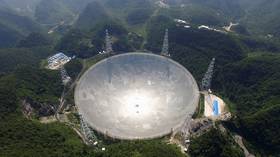China to attract international scientists to world’s largest radio telescope, left unrivaled since fall of US’ Arecibo (VIDEO)
The enormous 500-meter Aperture Spherical Telescope (FAST) located in southern China will open its doors to foreign specialists sometime next year, having no equivalents since the fall of the US Arecibo telescope.
“Our scientific committee aims to make FAST increasingly open to the international community,” chief inspector of the telescope's operations and development center, Wang Qiming, told journalists.
Furthermore, foreign scientists will even be able to remotely request necessary data from the FAST facility “so no scientists necessarily need to come here,” Wang said, as cited by RT's Ruptly video agency. “Our engineers here can actually operate according to the plan and then transmit the data back,” he pointed out.
FAST is the world's largest filled-aperture radio telescope, standing now as the only installation of its kind, after the famous Arecibo Observatory telescope in Puerto Rico came crashing down earlier this month.

According to John Dickey, a leading physicist from Australia’s University of Tasmania, FAST had been an impressive installation. “China is certainly a global center for scientific research, at the same level as North America or Western Europe,” he added as cited by AFP.
The 500-meter satellite dish cost a whopping 1.1 billion yuan ($175 million) to build and it has no close equivalent on the planet, especially since the destruction of the 305-meter Arecibo.
Thus, China’s colossal project is expected to be an unrivaled boon to the country’s scientific community.
Also on rt.com MOMENT massive Arecibo telescope collapsed caught in jaw-dropping footageThink your friends would be interested? Share this story!












